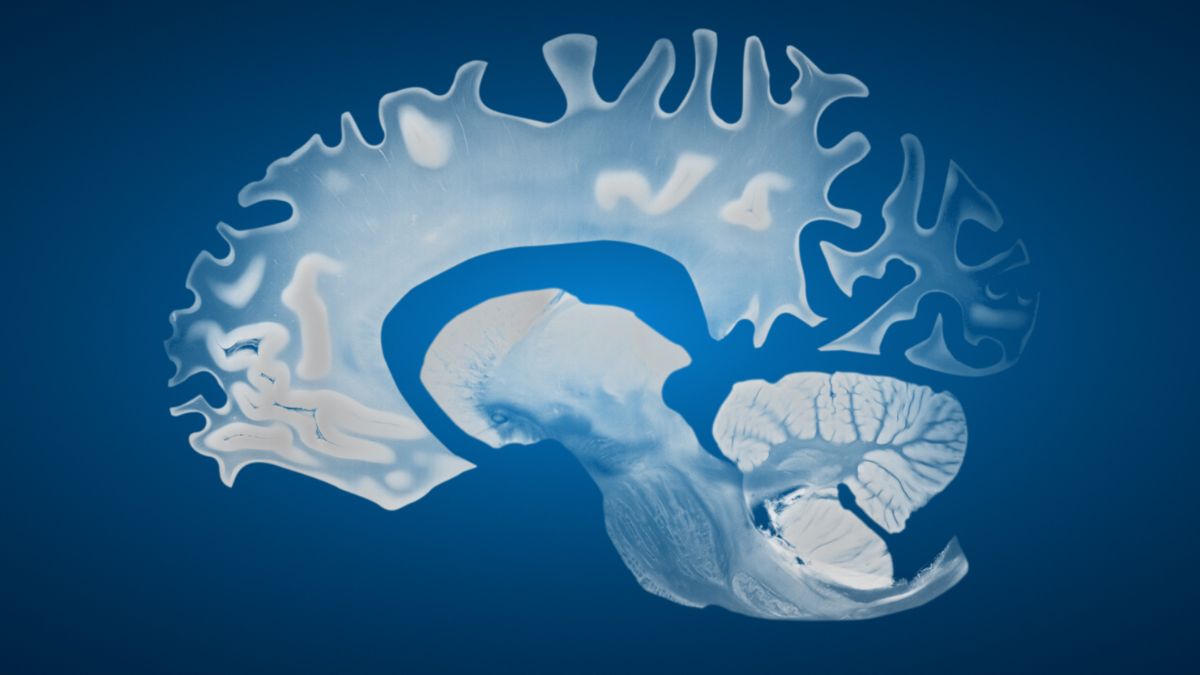By LUKE ANDREWS U.S. SENIOR HEALTH REPORTER
Taking prebiotics and a protein powder at the same time could reduce your risk of dementia, a study suggests.
Scientists in the UK asked 36 twin pairs, all over 60 years old, to consume protein powder, and then gave only half a prebiotic, a supplement that can fuel the growth of good bacteria in the intestines.
After three months, scientists found that the twins who received both the powder and prebiotic scored better on cognitive tests than their counterparts.
They also made fewer mistakes on tasks designed to detect early signs of Alzheimer’s disease, the most common cognitive disorder in old age that affects about 7million Americans.
Lead researcher Dr Mary Ni Lochlainn, a geriatrician at King’s College London, said: ‘We are excited to see these changes in just 12 weeks. This holds huge promise for enhancing brain health and memory in our aging population.’
The team believes the prebiotic harnessed the gut-brain axis and promoted the growth of good bacteria in the intestines that reduced inflammation in the brain and improved cognition.
The ‘gut-brain axis’, a network linking the digestive tract and the nervous system and brain, has been thought to be a key link between digestion and mental health for years, with some scientists claiming that the trillions of microbes in the intestines may influence mood, behavior and cognition.
Conducting the study in twins reduced the chances the changes observed were because of genetics, but the study was small, and scientists said it needs to be repeated in a larger group in order to support its findings.

A study has found that two common supplements could help prevent dementia (stock image)
Doctors at the Cleveland Clinic say the gut-brain axis explains everyday sensations such as ‘gut feelings’ or ‘butterflies’ in the stomach, and others suggest a balanced microbiome, or community of bacteria in the intestines, can boost brain function.
There are even suggestions an unbalanced microbiome in the gut could be linked to a higher risk of autism in children, and a higher risk of depression, Alzheimer’s and Parkinson’s.
Yet many experts caution that much of the research up to this point remains preliminary.
In the study, published in the journal Nature Communications, scientists gave all participants the protein powder BCAA, sold for about 70 cents a capsule and a common supplement used to boost muscle growth.
Half of the participants also received the prebiotic inulin, a type of fiber from roots, plus fructooligosaccharides, a type of carbohydrate found in plants and sometimes used as a low-calorie sweetener.
Prebiotic supplements are readily available online and in retailers and cost about $3 a pill.
Twins who received both the powder and prebiotic scored better on Paired Associates Learning (PAL) tests, or tests that involve matching similar images used to help recognize early signs of Alzheimer’s.
Tests on stool samples revealed twins who received the prebiotic had higher levels of Bifidobacterium in their gut compared to those not taking the supplement.
Bifidobacterium are healthy bacteria shown to boost the body’s immune system, improve digestion and even potentially help those struggling with depression and anxiety.
The researchers wrote in their study: ‘Our results demonstrate that cheap and readily available gut microbiome interventions may improve cognition in our ageing population.
‘To confirm our findings, a larger study which includes a range of cognitive tests, alongside measures of effect and attention, and detailed microbiome measures is warranted.’
The researchers said their findings would only apply to healthy adults and not to those who had already developed dementia.
Doctors at Johns Hopkins say that there is a ‘second brain’ in the gut, or the enteric nervous system, formed of two thin layers of more than 100million nerve cells that line the gastrointestinal tract from the throat to the rectum.
The cells do not ‘think’ like in the brain, primarily being involved in digestion and the release of enzymes to break down food, but there is evidence that they send signals back to the brain that can trigger shifts in mood.
Some studies have already linked this to shifts in mood in those with irritable bowel disease, a chronic bowel pain disorder, and caused by constipation or diarrhea.
Alzheimer’s disease is a debilitating condition that gradually robs sufferers of their abilities to take care of themselves, speak and remember events and people in their lives.
The number of Americans suffering from the condition is expected to surge, according to some estimates, and jump to almost 13million by 2050, nearly double today’s patient figure.
Warning signs of the disease include forgetting names or familiar objects, becoming lost in familiar places or unexplained changes in emotions.
There is no cure for the condition, but scientists have developed medications that may be able to slow the progression of the disease.
The cause of Alzheimer’s is not clear, but studies suggest it may be linked to a build-up of proteins in the brain, or to damage to blood vessels in the organ.
As part of the study, researchers also investigated whether the supplements influenced muscle growth.
Some scientists suggest that the regulation of muscle growth may be controlled by key signals from the gut.
All participants were asked to also complete a weight-lifting session twice per week, and do exercises including squats, calf raises and bicep curls.
Results showed no difference in muscle mass or chair rise times, the time it takes someone to get up from a chair, at the end of the study.
Researchers suggested this may have been because the study was too short to show any shifts in muscle mass.
Source link


